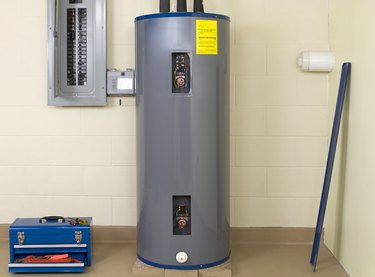
Whether your unit quit completely or is getting old and can't handle the heat, buying a new water heater can improve your showers and cleaning. Getting the sizing just right is essential to avoid running out of hot water. The tank size is a major factor, but there are other considerations.
Importance of Proper Sizing
Video of the Day
The most noticeable impact on your daily life is a water heater that's too small because it won't keep up with your hot water demands. This is most noticeable during busy times, such as mornings when everyone showers at the same time. It can also happen if you're doing multiple things with hot water simultaneously, such as showering, washing dishes, and washing laundry.
Video of the Day
Buying the biggest water heater you can find isn't the right solution either unless you need one that large. The biggest issue is heating more water than you need and keeping it hot until you use it, which can increase your utility bills. Analyzing your needs to get the correct size of water heater helps you balance hot water and energy efficiency.
Size of Your Family
The number of people living in your house impacts how much hot water you need. Both 30- and 40-gallon water tanks are on the small end and work best for only a few people. A 30-gallon tank would generally be enough for one or two people. A family of three to four will likely need a 40-gallon water heater, but you might need a larger tank if you use a lot of hot water.
How You Use Hot Water
Look at the average amount of hot water you use and the way you use it. Doing an audit of your water usage helps determine if you have high demands at certain times and about how much hot water you need daily. Some questions to ask include:
- How many showers do family members take each day?
- Do several people take showers at a certain time of day?
- How long do showers last?
- Do you have deep, oversize tubs that you use frequently?
- How often do you run your dishwasher?
- Do you wash laundry in hot water? If so, how many loads do you do on average?
These questions get you thinking about how much hot water you use daily and how much hot water it will take to keep up with the demands.
Water Heater First-Hour Rating
The first-hour rating is an important way to measure how much hot water a tank-style water heater can produce in an hour assuming it has a full tank of hot water at the beginning of the hour. The tank size is a key factor, but the burner or heating element affects the first-hour rating too. The size and source of heat can also play a role.
You can determine what type of first-hour rating you need based on water usage. Think about the peak time for hot water usage in your house. Maybe you give the kids a bath, shower yourself, run the dishwasher, and toss in a load of clothes at night. Estimate how much hot water you use in that time and find a water heater that has a first-hour rating that matches. For example, according to CenterPoint Energy, filling a tub takes 15 to 25 gallons, a shower takes about 3 gallons per minute, a dishwasher takes about 5 to 10 gallons, and the washing machine takes 25 to 40 gallons per load.
Reading Water Heater Specs
All new tank-style water heaters must have an EnergyGuide label on them to give you key information about the unit. This label should always provide the first-hour rating in the upper-left corner. It should be labeled as "capacity (first-hour rating)" followed by a gallon measurement. This tells you how many gallons of hot water the tank should produce in an hour when it starts with a full tank of hot water. Check the label to ensure the unit can provide you with enough hot water for your peak usage times.